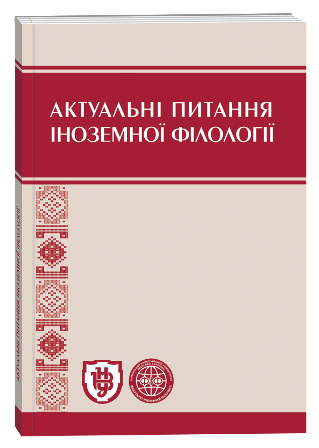THE LINGUISTIC AND EXTRALINGUISTIC MEANS OF REALIZING THE EMOTION OF JOY IN THE GERMAN FILMS
DOI:
https://doi.org/10.32782/2410-0927-2022-16-24Keywords:
emotion, emotion of joy, utterances, felicitarian utterances, structure, syntaxAbstract
The article presents the results of the study of verbal and nonverbal means of realizing the emotional state of joy in the speech of the characters of modern German films. The emotion of joy at work is seen as the main positive human emotion, which represents the inner satisfaction of the speaker from the results of his practical activities or creative activity, subjective positive evaluation of other people and their actions. Adjacent to this emotional state are happiness and pleasure, which are considered in the work as a kind of joy. Felicitarian statesments are a verbal means of realizing joy, they are such means of speech that in the context of a certain communicative situation are able to reproduce the positive emotional state of the speaker. Felicitarian statesments as a verbal means of expressing joy in German feature film are realized, for the most part, through words meaning joy, satisfaction and happiness. It is established in the article that for the verbalization of this emotional state, mostly, simple and elliptical sentences, complex predicative structures rarely serve as a tool for expressing this emotional state are used. It has been found that sometimes speakers resort to changing the structure of a sentence, turning it into an emotionally rich expression. Extralational means are one of the tools for realizing the emotion of joy in the speech of the characters of modern German films. Non-verbal means of communication as auxiliary and alternative tools for expressing this emotional state are considered. Prosodic, proxemic and kinetic means of information transmission are involved in the analysis. As a result of research, it was found that the main role is played by kinesic and prosodic means of expression of joy in the film. In this case, proxemics is one of the factors that also affect the nature of interpersonal interaction of speakers, creating favorable or less favorable conditions for the realization of the emotion of joy.
References
Абрамова Т. В. Диалогическое единство «Просьба – реакция» (на примере коммуникации в сети Фидонет) // Язык, коммуникация и социальная среда : [сб. научн. трудов]. Воронеж : Воронежский гос. ун-т, 2004. № 3. 178 с.
Гак В. Г. Эмоции и оценки в структуре высказывания // Вестн. Моск. ун-та, сер. 9. Филология, 1997. № 3. С. 87–93.
Леонтьев А. Н. Мотивы, эмоции, личность // Психология личности. Тексты. М., 2002. С. 71–81.
Маслова В. А. Эмоциональные концепты счастье, радость // Когнитивная лингвистика. Минск, 2004. С. 230–235.
Приходько Г. І. Невербальні засоби вираження емоцій // Науковий вісник ДДПУ імені І. Франка. Серія «Філологічні науки». Мовознавство. № 4, 2015. С. 150–153.
Engel U. Syntax der deutschen Gegenwartssprache. Berlin : E. Schmidt, 2009. 309 S.
Grammatik der deutschen Sprache / Dudenredaktion. Berlin; New York : Walter de Gruyter, 2017. 2569 S.
Helbig G. Deutsche Grammatik : Handbuch für Ausländerunterricht. Leipzig : Verlag Enzyklopädie, VEB, 2007. 629 S.
Henne H. Einfűhrung in die Gesprächsanalyse. Berlin; New York : de Gruyter GmbH & Co., 2001. 336 S.
Koch P. Sprache der Nähe-Sprache der Distanz // Romanistisches Jahrbuch, 2005. № 36. S. 79–88.
Plutchik R. The nature of emotions. URL: https://www.jstor.org/stable/27857503?seq=1#page_scan_tab_contents (дата звернення: 20.02.2022).







